Ti-Rong Wu
A Study of Solving Life-and-Death Problems in Go Using Relevance-Zone Based Solvers
Dec 23, 2025Abstract:This paper analyzes the behavior of solving Life-and-Death (L&D) problems in the game of Go using current state-of-the-art computer Go solvers with two techniques: the Relevance-Zone Based Search (RZS) and the relevance-zone pattern table. We examined the solutions derived by relevance-zone based solvers on seven L&D problems from the renowned book "Life and Death Dictionary" written by Cho Chikun, a Go grandmaster, and found several interesting results. First, for each problem, the solvers identify a relevance-zone that highlights the critical areas for solving. Second, the solvers discover a series of patterns, including some that are rare. Finally, the solvers even find different answers compared to the given solutions for two problems. We also identified two issues with the solver: (a) it misjudges values of rare patterns, and (b) it tends to prioritize living directly rather than maximizing territory, which differs from the behavior of human Go players. We suggest possible approaches to address these issues in future work. Our code and data are available at https://rlg.iis.sinica.edu.tw/papers/study-LD-RZ.
Learning Human-Like RL Agents Through Trajectory Optimization With Action Quantization
Nov 19, 2025Abstract:Human-like agents have long been one of the goals in pursuing artificial intelligence. Although reinforcement learning (RL) has achieved superhuman performance in many domains, relatively little attention has been focused on designing human-like RL agents. As a result, many reward-driven RL agents often exhibit unnatural behaviors compared to humans, raising concerns for both interpretability and trustworthiness. To achieve human-like behavior in RL, this paper first formulates human-likeness as trajectory optimization, where the objective is to find an action sequence that closely aligns with human behavior while also maximizing rewards, and adapts the classic receding-horizon control to human-like learning as a tractable and efficient implementation. To achieve this, we introduce Macro Action Quantization (MAQ), a human-like RL framework that distills human demonstrations into macro actions via Vector-Quantized VAE. Experiments on D4RL Adroit benchmarks show that MAQ significantly improves human-likeness, increasing trajectory similarity scores, and achieving the highest human-likeness rankings among all RL agents in the human evaluation study. Our results also demonstrate that MAQ can be easily integrated into various off-the-shelf RL algorithms, opening a promising direction for learning human-like RL agents. Our code is available at https://rlg.iis.sinica.edu.tw/papers/MAQ.
Relevance-Zone Reduction in Game Solving
Oct 01, 2025Abstract:Game solving aims to find the optimal strategies for all players and determine the theoretical outcome of a game. However, due to the exponential growth of game trees, many games remain unsolved, even though methods like AlphaZero have demonstrated super-human level in game playing. The Relevance-Zone (RZ) is a local strategy reuse technique that restricts the search to only the regions relevant to the outcome, significantly reducing the search space. However, RZs are not unique. Different solutions may result in RZs of varying sizes. Smaller RZs are generally more favorable, as they increase the chance of reuse and improve pruning efficiency. To this end, we propose an iterative RZ reduction method that repeatedly solves the same position while gradually restricting the region involved, guiding the solver toward smaller RZs. We design three constraint generation strategies and integrate an RZ Pattern Table to fully leverage past solutions. In experiments on 7x7 Killall-Go, our method reduces the average RZ size to 85.95% of the original. Furthermore, the reduced RZs can be permanently stored as reusable knowledge for future solving tasks, especially for larger board sizes or different openings.
Dynamic Sight Range Selection in Multi-Agent Reinforcement Learning
May 19, 2025Abstract:Multi-agent reinforcement Learning (MARL) is often challenged by the sight range dilemma, where agents either receive insufficient or excessive information from their environment. In this paper, we propose a novel method, called Dynamic Sight Range Selection (DSR), to address this issue. DSR utilizes an Upper Confidence Bound (UCB) algorithm and dynamically adjusts the sight range during training. Experiment results show several advantages of using DSR. First, we demonstrate using DSR achieves better performance in three common MARL environments, including Level-Based Foraging (LBF), Multi-Robot Warehouse (RWARE), and StarCraft Multi-Agent Challenge (SMAC). Second, our results show that DSR consistently improves performance across multiple MARL algorithms, including QMIX and MAPPO. Third, DSR offers suitable sight ranges for different training steps, thereby accelerating the training process. Finally, DSR provides additional interpretability by indicating the optimal sight range used during training. Unlike existing methods that rely on global information or communication mechanisms, our approach operates solely based on the individual sight ranges of agents. This approach offers a practical and efficient solution to the sight range dilemma, making it broadly applicable to real-world complex environments.
Strength Estimation and Human-Like Strength Adjustment in Games
Feb 24, 2025Abstract:Strength estimation and adjustment are crucial in designing human-AI interactions, particularly in games where AI surpasses human players. This paper introduces a novel strength system, including a strength estimator (SE) and an SE-based Monte Carlo tree search, denoted as SE-MCTS, which predicts strengths from games and offers different playing strengths with human styles. The strength estimator calculates strength scores and predicts ranks from games without direct human interaction. SE-MCTS utilizes the strength scores in a Monte Carlo tree search to adjust playing strength and style. We first conduct experiments in Go, a challenging board game with a wide range of ranks. Our strength estimator significantly achieves over 80% accuracy in predicting ranks by observing 15 games only, whereas the previous method reached 49% accuracy for 100 games. For strength adjustment, SE-MCTS successfully adjusts to designated ranks while achieving a 51.33% accuracy in aligning to human actions, outperforming a previous state-of-the-art, with only 42.56% accuracy. To demonstrate the generality of our strength system, we further apply SE and SE-MCTS to chess and obtain consistent results. These results show a promising approach to strength estimation and adjustment, enhancing human-AI interactions in games. Our code is available at https://rlg.iis.sinica.edu.tw/papers/strength-estimator.
OptionZero: Planning with Learned Options
Feb 23, 2025



Abstract:Planning with options -- a sequence of primitive actions -- has been shown effective in reinforcement learning within complex environments. Previous studies have focused on planning with predefined options or learned options through expert demonstration data. Inspired by MuZero, which learns superhuman heuristics without any human knowledge, we propose a novel approach, named OptionZero. OptionZero incorporates an option network into MuZero, providing autonomous discovery of options through self-play games. Furthermore, we modify the dynamics network to provide environment transitions when using options, allowing searching deeper under the same simulation constraints. Empirical experiments conducted in 26 Atari games demonstrate that OptionZero outperforms MuZero, achieving a 131.58% improvement in mean human-normalized score. Our behavior analysis shows that OptionZero not only learns options but also acquires strategic skills tailored to different game characteristics. Our findings show promising directions for discovering and using options in planning. Our code is available at https://rlg.iis.sinica.edu.tw/papers/optionzero.
Solving 7x7 Killall-Go with Seki Database
Nov 08, 2024


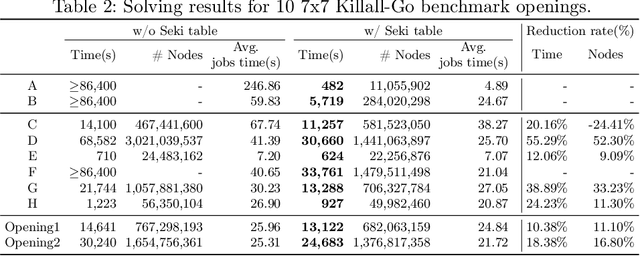
Abstract:Game solving is the process of finding the theoretical outcome for a game, assuming that all player choices are optimal. This paper focuses on a technique that can reduce the heuristic search space significantly for 7x7 Killall-Go. In Go and Killall-Go, live patterns are stones that are protected from opponent capture. Mutual life, also referred to as seki, is when both players' stones achieve life by sharing liberties with their opponent. Whichever player attempts to capture the opponent first will leave their own stones vulnerable. Therefore, it is critical to recognize seki patterns to avoid putting oneself in jeopardy. Recognizing seki can reduce the search depth significantly. In this paper, we enumerate all seki patterns up to a predetermined area size, then store these patterns into a seki table. This allows us to recognize seki during search, which significantly improves solving efficiency for the game of Killall-Go. Experiments show that a day-long, unsolvable position can be solved in 482 seconds with the addition of a seki table. For general positions, a 10% to 20% improvement in wall clock time and node count is observed.
Interpreting the Learned Model in MuZero Planning
Nov 07, 2024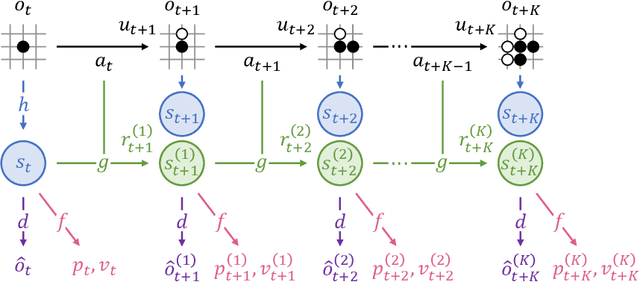
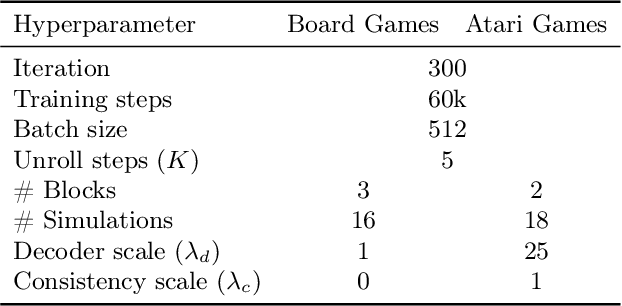
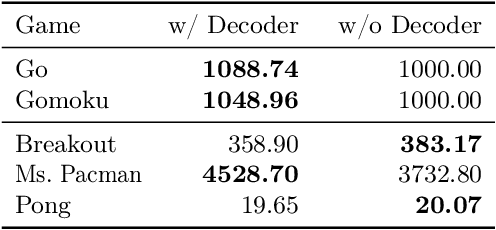
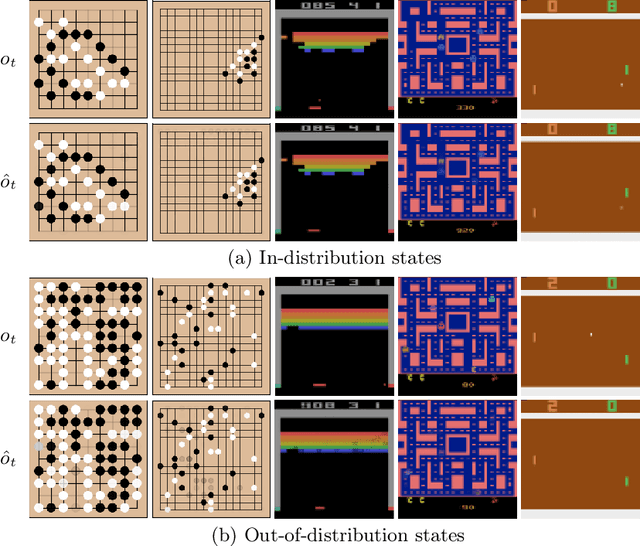
Abstract:MuZero has achieved superhuman performance in various games by using a dynamics network to predict environment dynamics for planning, without relying on simulators. However, the latent states learned by the dynamics network make its planning process opaque. This paper aims to demystify MuZero's model by interpreting the learned latent states. We incorporate observation reconstruction and state consistency into MuZero training and conduct an in-depth analysis to evaluate latent states across two board games: 9x9 Go and Outer-Open Gomoku, and three Atari games: Breakout, Ms. Pacman, and Pong. Our findings reveal that while the dynamics network becomes less accurate over longer simulations, MuZero still performs effectively by using planning to correct errors. Our experiments also show that the dynamics network learns better latent states in board games than in Atari games. These insights contribute to a better understanding of MuZero and offer directions for future research to improve the playing performance, robustness, and interpretability of the MuZero algorithm.
ResTNet: Defense against Adversarial Policies via Transformer in Computer Go
Oct 07, 2024Abstract:Although AlphaZero has achieved superhuman levels in Go, recent research has highlighted its vulnerability in particular situations requiring a more comprehensive understanding of the entire board. To address this challenge, this paper introduces ResTNet, a network that interleaves residual networks and Transformer. Our empirical experiments demonstrate several advantages of using ResTNet. First, it not only improves playing strength but also enhances the ability of global information. Second, it defends against an adversary Go program, called cyclic-adversary, tailor-made for attacking AlphaZero algorithms, significantly reducing the average probability of being attacked rate from 70.44% to 23.91%. Third, it improves the accuracy from 59.15% to 80.01% in correctly recognizing ladder patterns, which are one of the challenging patterns for Go AIs. Finally, ResTNet offers a potential explanation of the decision-making process and can also be applied to other games like Hex. To the best of our knowledge, ResTNet is the first to integrate residual networks and Transformer in the context of AlphaZero for board games, suggesting a promising direction for enhancing AlphaZero's global understanding.
Game Solving with Online Fine-Tuning
Nov 13, 2023Abstract:Game solving is a similar, yet more difficult task than mastering a game. Solving a game typically means to find the game-theoretic value (outcome given optimal play), and optionally a full strategy to follow in order to achieve that outcome. The AlphaZero algorithm has demonstrated super-human level play, and its powerful policy and value predictions have also served as heuristics in game solving. However, to solve a game and obtain a full strategy, a winning response must be found for all possible moves by the losing player. This includes very poor lines of play from the losing side, for which the AlphaZero self-play process will not encounter. AlphaZero-based heuristics can be highly inaccurate when evaluating these out-of-distribution positions, which occur throughout the entire search. To address this issue, this paper investigates applying online fine-tuning while searching and proposes two methods to learn tailor-designed heuristics for game solving. Our experiments show that using online fine-tuning can solve a series of challenging 7x7 Killall-Go problems, using only 23.54% of computation time compared to the baseline without online fine-tuning. Results suggest that the savings scale with problem size. Our method can further be extended to any tree search algorithm for problem solving. Our code is available at https://rlg.iis.sinica.edu.tw/papers/neurips2023-online-fine-tuning-solver.
 Add to Chrome
Add to Chrome Add to Firefox
Add to Firefox Add to Edge
Add to Edge